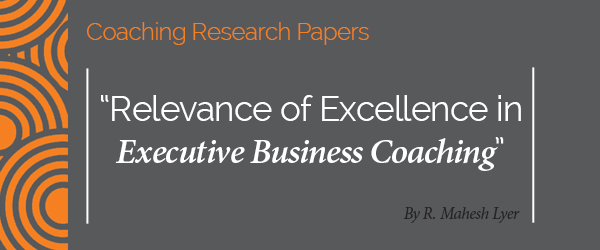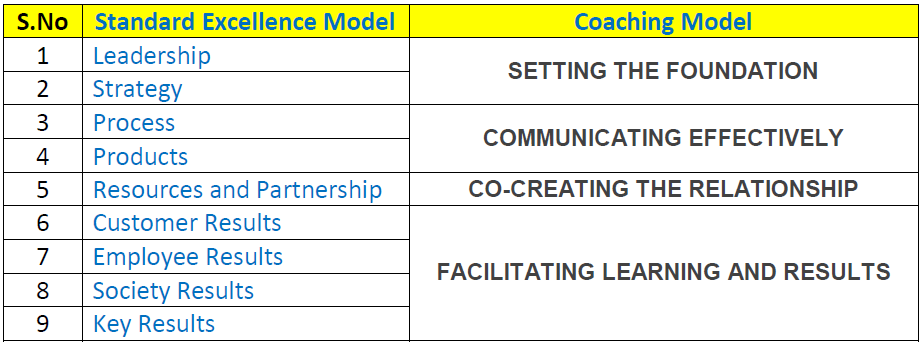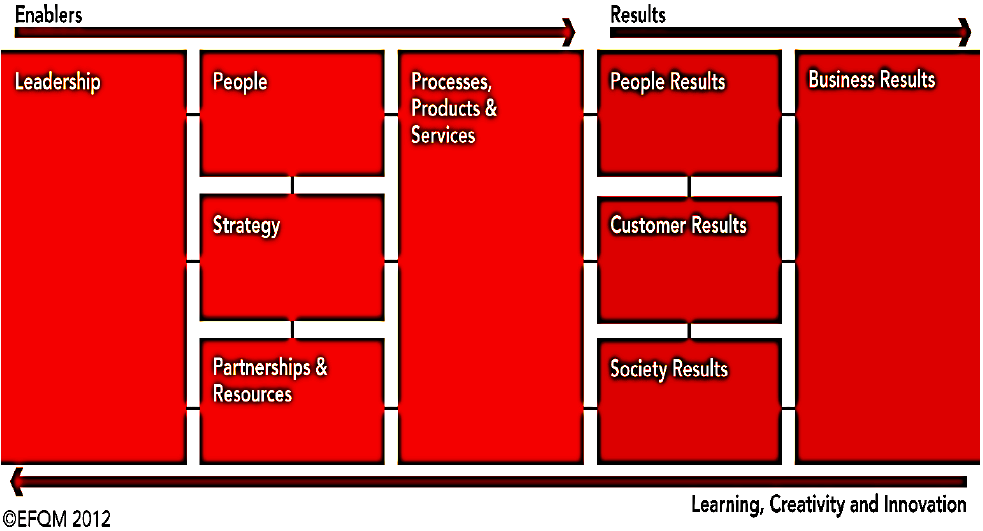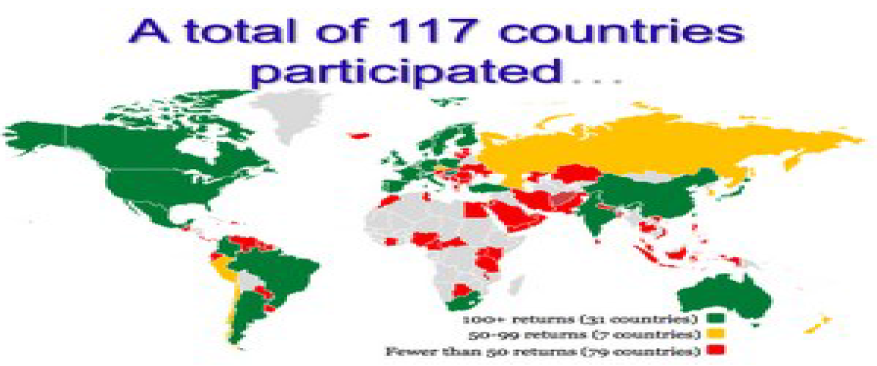A Research Paper By R. Mahesh Lyer
(Executive Coach, INDIA)
Introduction
Coaching is partnering with Clients in a thought provoking and creative process that inspires them to maximize their personal and professional potential. International Coaching Federation (ICF)
Executive Business Coaching in organizations is designed to help facilitate personal and professional potential to be maximized for individual growth and improved performance of the organization.This is achieved through a strong understanding of the ICF competencies, framework and ethical guidelines. The certification process is one such step to build a standard coaching procedure.
Organizations use Excellence models and Executive coaches use ICF framework to help move their organizations and clients respectively
- Where they are – Reflection – Current
- Where they want to be – Goals – Near term
- Where they can be – Potential – Future
However as both impact people and their agenda, can integrate the two models?
Currently, I am certified as an Assessor of the EFQM Model and was thereby keen to bring out how the Coaching Framework and Excellence frameworks can be integrated.
Different types of Excellence Models Several business excellence models exist world-wide. While variations exist, these models are all remarkably similar in the “Excellence” definition. The most common include:
[/bullet_block]
Executive coaches may also choose to bring in their own excellence models if they find it appropriate to the situation.
The EFQM Excellence Model
The EFQM Excellence Model is the most popular quality tool in Europe, used by more than 30 000 organizations to improve performance. It supports self-assessment, encourages reflecting and helps to improve the organization.
The EFQM Excellence Model has been reviewed to ensure it reflects the world we operate in. It encourages organizations to move from rigid corporate structures to more agile ones that are better suited to the rigours of today’s global economic environment.
What does it do? It is a framework to:
What are the benefits?
Guarantee to address the needs of all stakeholders
The EFQM framework is broken up into 5 enablers and 4 result areas. The linkages between the two are important and summarized below:
Enablers
Leadership
Excellent organizations have leaders who shape the future and make it happen, acting as role models for its values and ethics and inspiring trust at all times. They are flexible, enabling the organization to anticipate and react in a timely manner to ensure the ongoing success of the organization.
Strategy
Excellent organizations implement their mission and vision by developing a stakeholder focused strategy. Policies, plans, objectives and processes are developed and deployed to deliver the strategy.
People
Excellent organizations value their people and create a culture that allows the mutually beneficial achievement of organizational and personal goals. They develop the capabilities of their people and promote fairness and equality. They care for, communicate, reward and recognize, in a way that motivates people, builds commitment and enables them to use their skills and knowledge for the benefit of the organization.
Partnerships & Resources
Excellent organizations plan and manage external partnerships, suppliers and internal resources in order to support strategy and policies and the effective operation of processes.
Processes, Products & Services
Excellent organizations design, manage and improve processes to generate increasing value for customers and other stakeholders.
Results
Customer Results
Develop and agree on a set of performance indicators and related outcomes to determine the successful deployment of their strategy and supporting policies, based on the needs and expectations of their customers.
People Results
Develop and agree on a set of performance indicators and related outcomes to determine the successful deployment of their strategy and supporting policies, based on the needs and expectations of their people.
Society Results
Develop and agree on a set of performance indicators and related outcomes to determine the successful deployment of their societal and ecological strategy and related policies, based on the needs and expectations of the relevant external stakeholders.
Key Results
Develop and agree on a set of key financial and nonfinancial results to determine the successful deployment of their strategy, based on the needs and expectations of their key stakeholders. International Coaching Federation
Background The International Coaching Federation is the leading global coaching organization, with over 19,000 members, dedicated to advancing the coaching profession by setting high professional standards, providing independent certification, and building a network of credentialed coaches. The study was commissioned in 2011 by the International Coach Federation (ICF) and undertaken by PricewaterhouseCoopers. In late 2006, the ICF commissioned its first ever global industry study to provide a baseline picture of the profession; to identify what coaches saw as the major challenges; and to estimate the size of the profession.
Research Against that backdrop, the 2012 ICF Global Coaching Study was designed to be one of the most ambitious pieces of industry research ever conducted on the field of professional coaching. A primary goal was to engage with as many coaches as possible on a worldwide basis, thus providing an up-to- date picture of the profession to help meet the challenges ahead. Responses were received from professional coaches in 117 countries, an unprecedented response.
Results
A total of 117 countries participated. A total of 31 nations each received more than 100 survey returns; representing all the major world regions. With 12,133 valid responses, the survey is extremely large in scale, providing a wealth of detailed information on the coaching profession. More than 7,700 ICF members responded to the survey, with an additional 4,400 from non-ICF members.
Given that no accepted, globally inclusive list of coaches was available to use as a sampling frame for the survey, it was necessary on this study to estimate the number of coaches. This was done using a ‘membership ratio method,’ or by combining the known ICF membership numbers with the estimated memberships of other organizations as they were reported on the survey. Using this method, it was estimated that there are presently in the region of 47,500 professional coaches worldwide.
with the prospective and new client about the coaching process and relationship.
B. Co-Creating the Relationship
Establishing Trust and Intimacy with the Client
Ability to create a safe, supportive environment that produces ongoing mutual respect and trust.
Coaching Presence
Ability to be fully conscious and create spontaneous relationship with the client, employing a style that is open, flexible and confident.
C. Communicating Effectively
Active Listening
Ability to focus completely on what the client is saying and is not saying, to understand the meaning of what is said in the context of the client’s desires, and to support client self-expression.
Powerful Questioning
Ability to ask questions that reveal the information needed for maximum benefit to the coaching relationship and the client.
Direct Communication
Ability to communicate effectively during coaching sessions, and to use language that has the greatest positive impact on the client.
D. Facilitating Learning and Results
Creating Awareness
Ability to integrate and accurately evaluate multiple sources of information, and to make interpretations that help the client to gain awareness and thereby achieve agreed-upon results.
Designing Actions
Ability to create with the client opportunities for ongoing learning, during coaching and in work/life situations, and for taking new actions that will most effectively lead to agreed-upon coaching results.
Planning and Goal Setting
Ability to develop and maintain an effective coaching plan with the client.
Managing Progress and Accountability
Ability to hold attention on what is important for the client, and to leave responsibility with the client to take action.
Application in Coaching as both Business Excellence framework and Coaching framework elicit the same type of powerful questions to move forward.
Educating the Global Coaching profession of 47,500 professional worldwide about the basic premise of excellence framework can be a daunting task.
If Business Executive Coaches can appreciate an Excellence framework, then it can increase the trust levels of the Executive coaching for Business as both can be on the same journey. Executive coaches therefore need to be aware of this and factor an element of excellence into their agenda.
References:
http://www.coachfederation.org/



